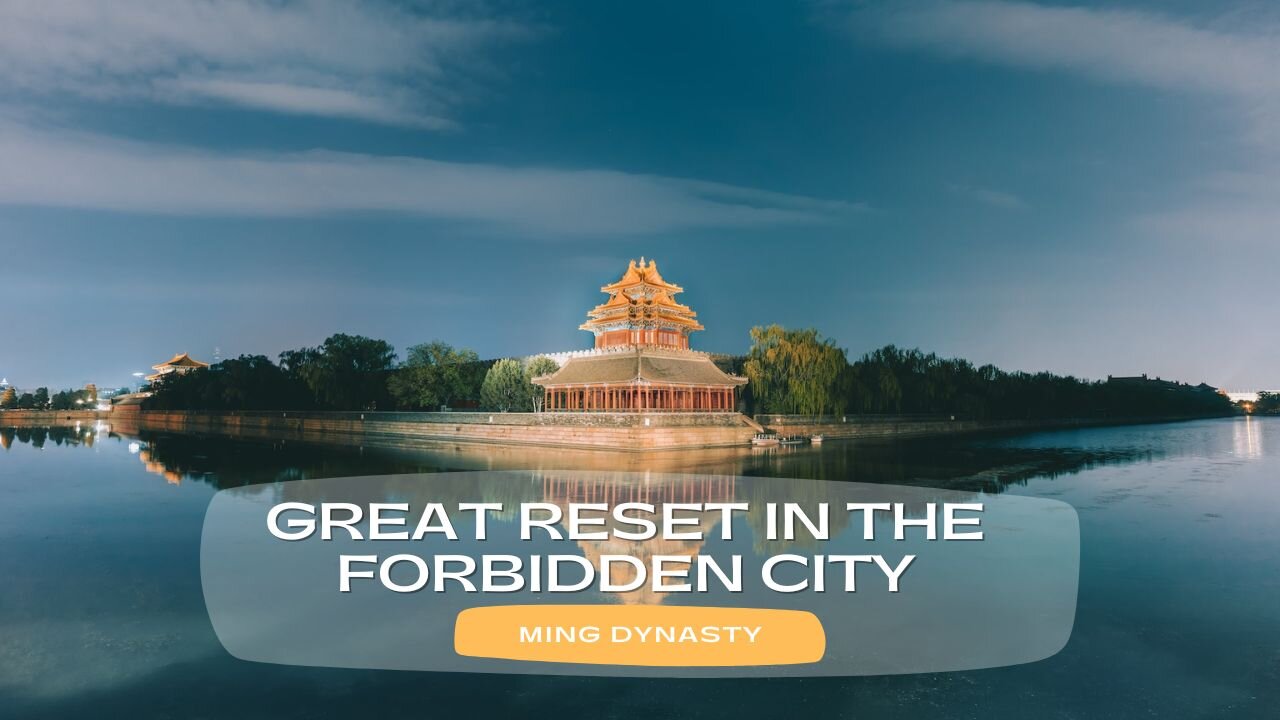Premium Only Content

Destructive Great Reset in The Forbidden City During the Ming Dynasty
Looking into the Ming Dynasty and possible traces of a destructive event
-
The Ming dynasty officially the Great Ming, was an imperial dynasty of China, ruling from 1368 to 1644 following the collapse of the Mongol-led Yuan dynasty. The Ming dynasty was the last imperial dynasty of China ruled by the Han people, the majority ethnic group in China. Although the primary capital of Beijing fell in 1644 to a rebellion led by Li Zicheng (who established the short-lived Shun dynasty), numerous rump regimes ruled by remnants of the Ming imperial family—collectively called the Southern Ming—survived until 1662.
-
The Ming dynasty's founder, the Hongwu Emperor (r. 1368–1398), attempted to create a society of self-sufficient rural communities ordered in a rigid, immobile system that would guarantee and support a permanent class of soldiers for his dynasty; the empire's standing army exceeded one million troops and the navy's dockyards in Nanjing were the largest in the world.
-
He also took great care breaking the power of the court eunuchs and unrelated magnates, investing his many sons throughout China and attempting to guide these princes through the Huang-Ming Zuxun, a set of published dynastic instructions.
-
This failed when his teenage successor, the Jianwen Emperor, attempted to curtail his uncles' power, prompting the Jingnan campaign, an uprising that placed the Prince of Yan upon the throne as the Yongle Emperor in 1402.
-
The rise of new emperors and new factions diminished such extravagances; the capture of the Emperor Yingzong of Ming during the 1449 Tumu Crisis ended them completely. The imperial navy was allowed to fall into disrepair while forced labor constructed the Liaodong palisade and connected and fortified the Great Wall into its modern form.
-
By the 16th century, however, the expansion of European trade – albeit restricted to islands near Guangzhou such as Macau – spread the Columbian Exchange of crops, plants, and animals into China, introducing chili peppers to Sichuan cuisine and highly productive maize and potatoes, which diminished famines and spurred population growth. The growth of Portuguese, Spanish, and Dutch trade created new demand for Chinese products and produced a massive influx of Japanese and American silver.
-
-
![The Man In The Red Cap Ushers In The Purification | Hopi Prophecy [Timestamp 16:35]](https://1a-1791.com/video/s8/1/E/k/O/v/EkOvv.0kob-small-The-Man-In-The-Red-Cap-Ushe.jpg) 26:46
26:46
The Aquarius Bus
2 months agoThe Man In The Red Cap Ushers In The Purification | Hopi Prophecy [Timestamp 16:35]
1.48K5 -
 LIVE
LIVE
Kim Iversen
3 hours agoJeffrey Sachs Just Exposed the Truth They Don’t Want You to Hear
1,715 watching -
 LIVE
LIVE
Glenn Greenwald
1 hour agoGlenn From Moscow: Russia Reacts to Trump; Michael Tracey Debates Ukraine War | SYSTEM UPDATE #413
2,331 watching -
 LIVE
LIVE
Wahzdee
4 hours agoSniper Elite Then Extraction Games—No Rage Challenge! 🎮🔥 - Tuesday Solos
950 watching -
 2:12:58
2:12:58
Robert Gouveia
4 hours agoSenator's Wife EXPOSED! Special Counsel ATTACKS; AP News BLOWN OUT
29.7K26 -
 55:07
55:07
LFA TV
1 day agoDefending the Indefensible | TRUMPET DAILY 2.25.25 7PM
4.89K5 -
 6:09:26
6:09:26
Barry Cunningham
10 hours agoTRUMP DAILY BRIEFING - WATCH WHITE HOUSE PRESS CONFERENCE LIVE! EXECUTIVE ORDERS AND MORE!
46.4K37 -
 1:46:37
1:46:37
Game On!
5 hours ago $2.51 earnedPUMP THE BRAKES! Checking Today's Sports Betting Lines!
19.9K1 -
 1:27:21
1:27:21
Redacted News
4 hours agoBREAKING! SOMETHING BIG IS HAPPENING AT THE CIA AND FBI RIGHT NOW, AS KASH PATEL CLEANS HOUSE
142K180 -
 1:08:28
1:08:28
In The Litter Box w/ Jewels & Catturd
1 day agoCrenshaw Threatens Tucker | In the Litter Box w/ Jewels & Catturd – Ep. 749 – 2/25/2025
77.7K44